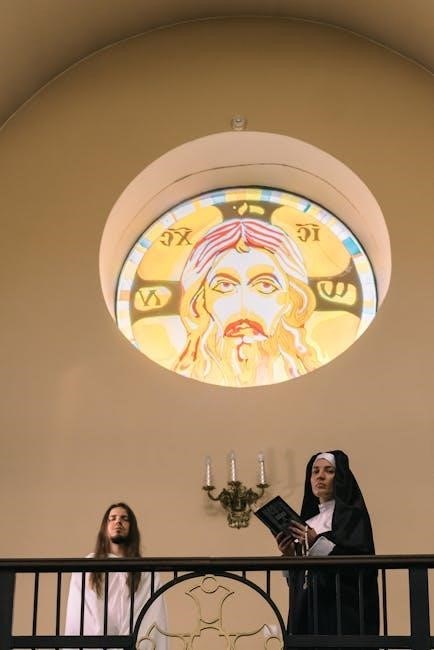The Church of God in Christ Manual serves as a foundational document guiding the church’s governance, doctrine, and spiritual practices․ It outlines leadership roles, member responsibilities, and financial stewardship, ensuring unity and accountability across the organization while fostering spiritual growth and community impact․ This manual is essential for both members and leaders, providing clarity on church operations and upholding the principles of holiness and Pentecostal truth․
1․1 Overview of the Church of God in Christ (COGIC)
The Church of God in Christ (COGIC) is a prominent Pentecostal Holiness denomination founded in 1897 by Bishop Charles Price Jones․ It emphasizes salvation, sanctification, and the baptism of the Holy Spirit, adhering to biblical teachings․ COGIC is known for its vibrant worship, community engagement, and structured governance․ The manual serves as a guiding document, ensuring unity in doctrine, leadership, and practices across its global congregations․
1․2 Purpose and Importance of the Manual
The Church of God in Christ Manual is a governing document that provides clarity on doctrine, leadership, and practices․ Its purpose is to unify the church’s operations, ensuring accountability and consistency across all levels․ The manual is vital for maintaining spiritual integrity, guiding members in their faith journey, and upholding the principles of holiness and Pentecostal truth․ It serves as a foundational resource for both leadership and congregants․

History and Founding of the Church of God in Christ
The Church of God in Christ was founded in 1897 by Bishop Charles Harrison Mason, emerging from the Holiness-Pentecostal movement in the southern United States․
2․1 Founding and Early Years
The Church of God in Christ (COGIC) was founded in 1897 by Bishop Charles Harrison Mason, emerging from the Holiness-Pentecostal movement․ It began with a small group of believers in Arkansas, focusing on holiness and the Baptism of the Holy Spirit․ The early years were marked by persecution and challenges, but the church grew rapidly, establishing its first convocation in 1897․ By 1907, COGIC was officially recognized as a Pentecostal body, laying the groundwork for its future influence․
2․2 Key Figures in the Church’s History
Bishop Charles Harrison Mason, the founder, played a pivotal role in shaping COGIC’s identity․ Other influential leaders include Bishop C․ H․ Mason Jr․, who expanded the church’s reach, and Mother Lizzie Robinson, a trailblazing evangelist․ Their dedication and vision laid the foundation for COGIC’s growth and spiritual impact, ensuring its legacy as a prominent voice in the Pentecostal movement;
Leadership Structure and Hierarchy
The Church of God in Christ operates under a hierarchical structure led by bishops and pastors, ensuring governance and equipping saints for ministry and community service․
3․1 Structure of the Church Governance
The Church of God in Christ operates under a centralized hierarchical structure, with authority flowing from the General Assembly to bishops, pastors, and local church leaders․ Bishops oversee jurisdictions, while pastors manage local congregations, ensuring spiritual and administrative guidance․ This structured governance ensures unity, accountability, and effective decision-making, aligning with the church’s mission and doctrinal standards․
3․2 Role of Bishops, Pastors, and Other Leaders
Bishops in the Church of God in Christ are spiritual overseers, guiding jurisdictions and ensuring doctrinal integrity․ Pastors lead local congregations, fostering spiritual growth and community engagement․ Together, they equip the saints for ministry, promoting holiness and the Pentecostal truth․ Their collaborative leadership strengthens the church, maintaining order and advancing its mission effectively․

Doctrine and Sacraments
The Church of God in Christ upholds Pentecostal Holiness doctrine, emphasizing salvation, sanctification, and the Holy Spirit’s baptism․ Sacraments like baptism and the Lord’s Supper are central to worship and spiritual life, reflecting the church’s commitment to biblical teachings and fostering a deeper connection with God․
4․1 Core Beliefs and Teachings
The Church of God in Christ adheres to foundational Christian doctrines, emphasizing the Trinity, salvation through Jesus Christ, and the transformative power of the Holy Spirit․ Central teachings include justification, sanctification, and the baptism of the Holy Ghost, which empower believers for holy living․ The church upholds the authority of Scripture, promoting a lifestyle of righteousness, prayer, and evangelism, while fostering a community rooted in faith, love, and service․
4․2 Sacraments and Ordinances
The Church of God in Christ observes sacraments and ordinances as vital expressions of faith․ Water baptism by immersion symbolizes spiritual rebirth, while the Lord’s Supper commemorates Christ’s sacrifice․ These practices, rooted in biblical teachings, are essential for spiritual growth and maintaining a covenant relationship with God․ They foster unity and accountability among believers, reinforcing the church’s commitment to holy living and obedience to divine commands․

Leadership Development and Training
The Church of God in Christ emphasizes structured programs to equip leaders with spiritual and practical skills․ Workshops, mentorship, and resources are provided to enhance ministerial effectiveness and foster growth․
5․1 Programs for Ministerial Training
The Church of God in Christ offers comprehensive ministerial training programs designed to equip leaders with both spiritual and practical skills․ These programs include workshops, seminars, and mentorship opportunities, ensuring ministers are well-prepared to serve effectively; The training emphasizes biblical teachings, leadership development, and community engagement, fostering a strong foundation for ministry․ These initiatives are crucial for sustaining the church’s mission and nurturing future leaders․
5․2 Role of the Saints in Ministry
The saints play a vital role in ministry, serving as the hands and feet of Christ in their communities․ They are empowered to evangelize, disciple, and serve others, demonstrating God’s love through practical acts of kindness․ The church encourages every member to actively participate in ministry, using their gifts and talents to further the kingdom․ This collective effort strengthens the church and fosters spiritual and community growth․

Membership Expectations and Responsibilities
Members are expected to uphold biblical standards, actively participate in church activities, and support the church financially and spiritually․ Responsibilities include living a holy life and serving others․
6․1 Spiritual and Financial Commitments
Members are required to uphold spiritual disciplines, including regular prayer, Bible study, and tithing․ Financial commitments involve contributing tithes and offerings to support church ministries and community outreach․ Spiritual growth is emphasized through personal holiness and active participation in church activities, ensuring members fulfill their covenant obligations to God and the church community․
6․2 The Process of Sanctification
Sanctification is a lifelong journey of holiness, rooted in the believer’s commitment to God․ It involves initial consecration and ongoing dedication to a life of purity, guided by prayer, fasting, and Bible study․ The Holy Spirit empowers believers to live a life separated from worldly desires, manifesting fruits of the spirit such as love, joy, and humility․ Regular communion and accountability within the church community support this transformative process․

The Church’s Role in the Community
The Church of God in Christ actively engages in community outreach, providing spiritual guidance, social services, and support to those in need․ Programs such as food drives, health clinics, and youth mentorship initiatives demonstrate its commitment to uplifting communities and fostering unity․ By addressing both spiritual and practical needs, the church serves as a beacon of hope and transformation;
7․1 Community Outreach and Social Programs
The Church of God in Christ prioritizes community outreach through various social programs, including food drives, health clinics, and youth mentorship initiatives․ These efforts aim to empower individuals and uplift communities․ The church also partners with local organizations to provide resources and support, addressing both spiritual and practical needs․ By fostering unity and compassion, COGIC demonstrates its commitment to serving as a transformative force in society․
7․2 The Church’s Stance on Social Justice
The Church of God in Christ actively advocates for social justice, addressing systemic inequalities and promoting human rights․ Rooted in biblical principles, the church supports initiatives that uplift marginalized communities, focusing on education, healthcare, and economic empowerment․ By aligning its efforts with spiritual mandates, COGIC strives to create a just and compassionate society, reflecting God’s love and mercy for all people․

Financial Management and Stewardship
Tithing and offerings are fundamental to COGIC’s financial stewardship, ensuring resources for church operations and community support, aligning with biblical principles of giving and accountability․
8․1 Tithing and Offerings
Tithing and offerings are central to COGIC’s financial practices, supporting church operations, community programs, and global missions․ Rooted in biblical principles, tithing (10% of income) and offerings reflect obedience to God, while ensuring resources are allocated transparently and accountably to further the church’s mission and ministry․
8․2 Budgeting and Resource Allocation
Budgeting and resource allocation in COGIC ensure responsible stewardship of funds, aligning with the church’s mission․ Annual budgets are prepared to distribute resources transparently, supporting local and global ministries, outreach programs, and operational needs․ This process emphasizes accountability, ensuring tithes and offerings are used effectively to further God’s work and maintain church integrity․

Disciplinary Procedures and Church Governance
The Church of God in Christ Manual outlines clear disciplinary procedures to maintain order and accountability among members and leaders, ensuring adherence to biblical principles and church policies․
9․1 Handling Disputes and Misconduct
The Church of God in Christ Manual provides detailed procedures for addressing disputes and misconduct within the church․ These procedures ensure unity, accountability, and adherence to biblical principles․ They include mediation, conflict resolution, and leadership intervention to handle issues fairly and transparently, promoting harmony and maintaining the integrity of the church’s mission and values․
9․2 The Process of Excommunication
The Church of God in Christ Manual outlines a structured process for excommunication, ensuring biblical principles guide decisions․ This process typically involves investigation, review of evidence, and a hearing with church leaders․ Excommunication is considered a last resort, emphasizing redemption and spiritual accountability․ The decision must align with church doctrine and be approved by appropriate authorities to maintain congregational unity and integrity․

Cultural and Historical Impact
The Church of God in Christ has significantly influenced African American religious culture, promoting holiness and Pentecostal values․ Its historical impact extends to community development and civil rights movements, shaping spiritual and social landscapes nationwide․
10․1 Influence on Music and Arts
The Church of God in Christ has profoundly shaped gospel music, fostering iconic choirs and artists who blend spiritual messages with vibrant melodies․ Its musical traditions, deeply rooted in African American culture, have inspired global audiences and influenced various genres․ The church’s emphasis on creative expression has also nurtured artists, preserving cultural heritage while advancing spiritual and artistic excellence․
10․2 The Church’s Role in Social Movements
The Church of God in Christ has played a pivotal role in social movements, advocating for civil rights and justice․ Through its leadership, the church supported key figures like Martin Luther King Jr․, fostering nonviolent protests and community empowerment․ Its teachings emphasized equality and compassion, inspiring members to actively engage in addressing systemic inequalities and advocating for the marginalized, both historically and in contemporary society․
The Church of God in Christ Manual remains a vital guide, ensuring adherence to sacred principles․ It envisions a future rooted in holiness, inspiring continued spiritual growth and community impact․
11․1 The Church’s Vision for the Future
The Church of God in Christ envisions a future marked by spiritual growth, holistic outreach, and unwavering commitment to holiness․ It aims to expand its global impact through dynamic leadership development and community engagement․ By adapting to modern challenges while remaining rooted in its Pentecostal heritage, the church seeks to inspire future generations to embrace its mission of spreading the Gospel and fostering transformative change․
11․2 The Importance of Adhering to the Manual
Adhering to the Church of God in Christ Manual ensures unity, accountability, and spiritual integrity across the organization․ It provides clear guidelines for doctrine, leadership, and member conduct, safeguarding the church’s mission and values․ By following the manual, the church maintains order, fosters disciple-making, and upholds the principles of holiness and Pentecostal truth․ Compliance is essential for preserving the church’s legacy and fulfilling its divine purpose effectively․

No Responses